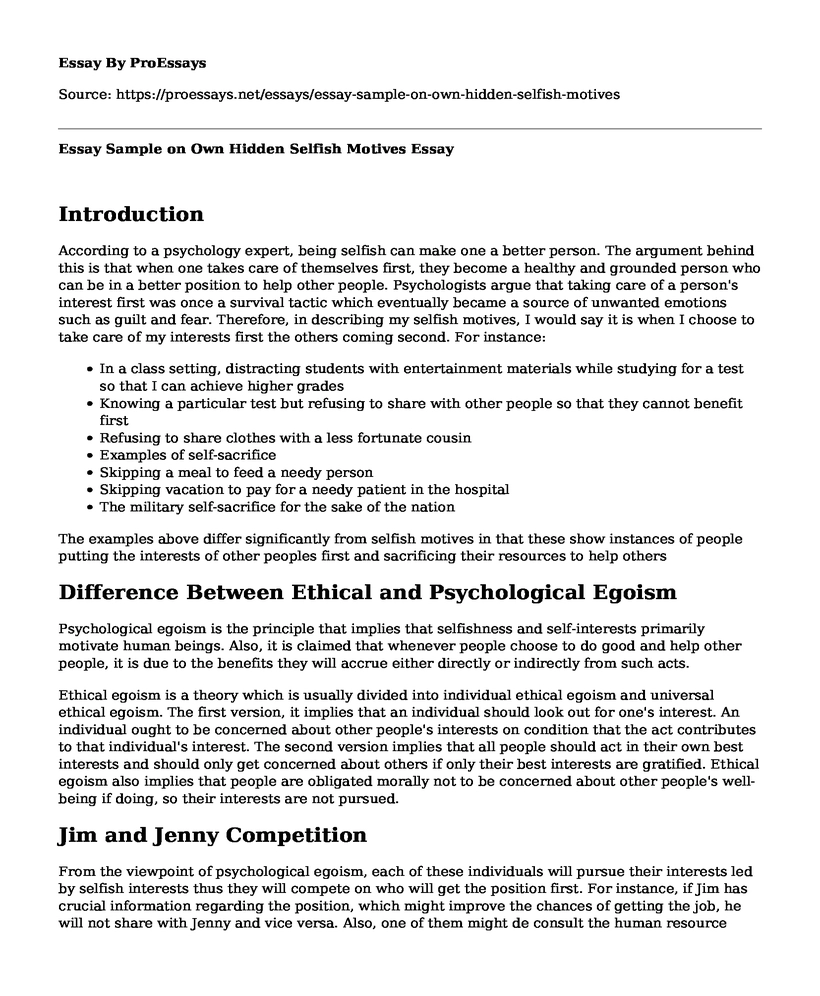Introduction
According to a psychology expert, being selfish can make one a better person. The argument behind this is that when one takes care of themselves first, they become a healthy and grounded person who can be in a better position to help other people. Psychologists argue that taking care of a person's interest first was once a survival tactic which eventually became a source of unwanted emotions such as guilt and fear. Therefore, in describing my selfish motives, I would say it is when I choose to take care of my interests first the others coming second. For instance:
- In a class setting, distracting students with entertainment materials while studying for a test so that I can achieve higher grades
- Knowing a particular test but refusing to share with other people so that they cannot benefit first
- Refusing to share clothes with a less fortunate cousin
- Examples of self-sacrifice
- Skipping a meal to feed a needy person
- Skipping vacation to pay for a needy patient in the hospital
- The military self-sacrifice for the sake of the nation
The examples above differ significantly from selfish motives in that these show instances of people putting the interests of other peoples first and sacrificing their resources to help others
Difference Between Ethical and Psychological Egoism
Psychological egoism is the principle that implies that selfishness and self-interests primarily motivate human beings. Also, it is claimed that whenever people choose to do good and help other people, it is due to the benefits they will accrue either directly or indirectly from such acts.
Ethical egoism is a theory which is usually divided into individual ethical egoism and universal ethical egoism. The first version, it implies that an individual should look out for one's interest. An individual ought to be concerned about other people's interests on condition that the act contributes to that individual's interest. The second version implies that all people should act in their own best interests and should only get concerned about others if only their best interests are gratified. Ethical egoism also implies that people are obligated morally not to be concerned about other people's well-being if doing, so their interests are not pursued.
Jim and Jenny Competition
From the viewpoint of psychological egoism, each of these individuals will pursue their interests led by selfish interests thus they will compete on who will get the position first. For instance, if Jim has crucial information regarding the position, which might improve the chances of getting the job, he will not share with Jenny and vice versa. Also, one of them might de consult the human resource personnel to get assistance on the possibility of acquiring the job, and they will not share that information.
From an ethical egoism viewpoint, both Jenny and Jim will be concerned about each other if only it will benefit them. For instance, Jenny might decide to help Jim with interview tips under one condition that if he gets the job, he will consider promoting her or recommend her to get a better position in the company. Besides, she might share any crucial information regarding getting the position for financial gain.
Nature of Relationship After Acquiring the Job
After the decision has been made on who has been awarded the new position, the relationship between Jim and Jenny will be strained. The one who gets the job will feel superior and might intimidate the other one as he/she continues to pursue self-interests.
Cite this page
Essay Sample on Own Hidden Selfish Motives. (2022, Nov 11). Retrieved from https://proessays.net/essays/essay-sample-on-own-hidden-selfish-motives
If you are the original author of this essay and no longer wish to have it published on the ProEssays website, please click below to request its removal:
- Essay Sample on Schizophrenia: Assessment, and Treatment
- Stages of the Helping Process Paper Example
- Healthcare And Aging - Essay Sample
- Deep Listening: A Path to Stress Relief - Essay Sample
- Literary Analysis Essay on Shakespeare's Hamlet
- Essay on Ethics Awareness Inventory (EAI): Analyzing Ethical Perspectives Critically
- Self-Esteem: Brain's Vital Role in Interpersonal Interactions - Free Paper







